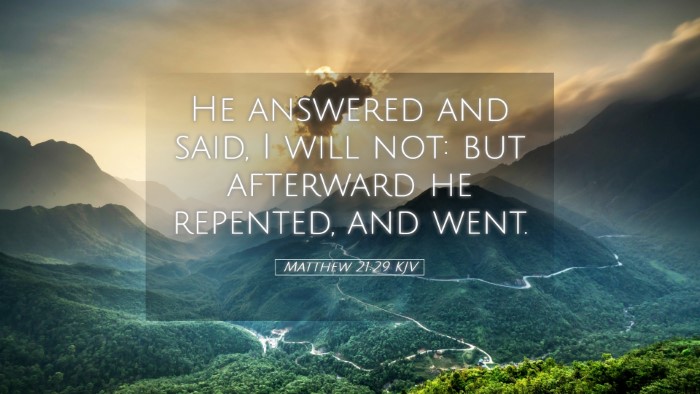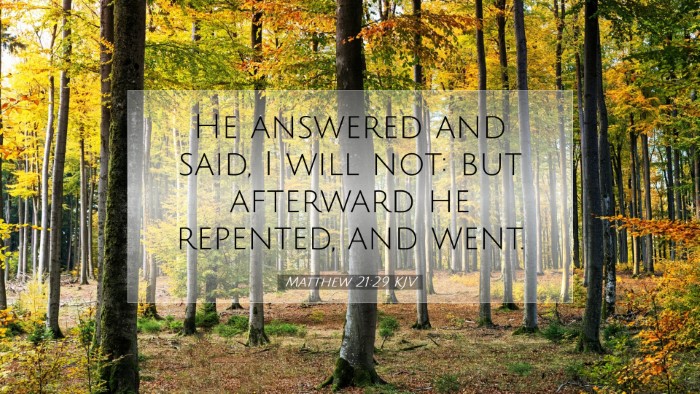Commentary on Matthew 21:29
Bible Verse: Matthew 21:29 - "He answered and said, I will not: but afterward he repented, and went."
Introduction
This verse is part of a parable delivered by Jesus, known as the Parable of the Two Sons. Through this narrative, Christ addresses the attitudes of those who profess to follow Him and contrasts it with genuine obedience to God's will. The interaction between the father and his sons serves as a reflection on repentance, obedience, and the Kingdom of God.
Contextual Background
Matthew 21:28-32 serves a dual purpose; it is not only aimed at the Pharisees but also at all who hear. In its immediate context, this parable follows the triumphal entry into Jerusalem and precedes Christ's cleansing of the temple, emphasizing the importance of sincere response to God's call.
Verse Analysis
1. The Father's Command
The father in the parable represents God, who calls His people to labor in His vineyard, symbolizing the work in His Kingdom. The command is direct and implies responsibility.
2. The Response of the First Son
The first son’s initial refusal reflects the attitude of many who may outwardly reject God’s call but later repent. This attitude is significant because it represents the impulse of human rebellion toward divine authority, an inclination seen in many figures throughout biblical history.
3. The Repentance and Action
Despite his initial resistance, the son's eventual obedience signifies the transformative power of true repentance. As noted by Matthew Henry, "the true test of repentance is not sorrow for sin, but a change in behavior." The essence of this repentance is an active restoration of relationship and alignment with the father's will.
4. The Contrast with the Second Son
In contrast, the second son portrays the hypocrisy of those who profess obedience yet fail to act. This juxtaposition reflects a profound truth about God's expectations: it is not merely the words that count, but the actions arising from them.
Theological Insights
1. Repentance
Repentance is a core theme, as highlighted by Adam Clarke, who states that "True repentance is seen in the change of action following the change of heart." This understanding serves as a reminder to believers that mere acknowledgment of sin is insufficient without the corresponding transformation of life.
2. The Nature of Disobedience
The narrative conveys that every individual may experience disobedience but emphasizes that it’s the return to God that showcases one’s true discipleship. Albert Barnes emphasizes that "it is better for a man to start in the wrong direction and return than to appear to comply while remaining distant from the will of God."
3. The Kingdom of God
Christ’s closing statement regarding tax collectors and harlots entering the Kingdom before the religious leaders underscores the radical grace of God. It illustrates that those who openly disobey may be more receptive to God's call than those who outwardly claim fidelity yet are unresponsive. This element resonates with Matthew Henry's assertion that "the grace of God often abounds in those who are the least expected to receive it."
Application for Believers
1. Authentic Obedience
The call to authentic obedience is paramount. Followers of Christ are encouraged to examine their actions in light of their proclaimed faith. This self-examination can lead to a more profound understanding of God’s will and a genuine commitment to His service.
2. Embracing Repentance
Believers are reminded that repentance is not a one-time act but a lifestyle. When one fails or initially rejects God's call, the appropriate response is turning back to the Father, as illustrated by the first son.
3. Engaging in God's Vineyard
Lastly, the parable prompts all people to engage actively in God’s work. Whether called to preach, teach, or serve in various capacities, the essence lies in responding positively to God’s charge, as demonstrated in this poignant narrative.
Conclusion
Matthew 21:29 encapsulates a profound message regarding obedience and repentance that resonates through ages. By drawing upon the insights of theologians such as Matthew Henry, Albert Barnes, and Adam Clarke, we glean a multifaceted understanding of this parable's implications. Through this verse, Jesus invites every individual into a deeper relationship with Him, marked not by mere words but by genuine actions reflecting God’s will and purpose in the world.


